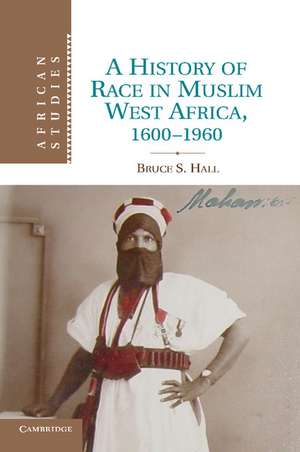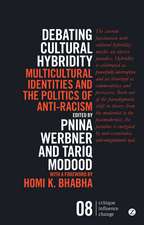A History of Race in Muslim West Africa, 1600–1960: African Studies, cartea 115
Autor Bruce S. Hallen Limba Engleză Paperback – 19 mar 2014
| Toate formatele și edițiile | Preț | Express |
|---|---|---|
| Paperback (1) | 273.13 lei 6-8 săpt. | |
| Cambridge University Press – 19 mar 2014 | 273.13 lei 6-8 săpt. | |
| Hardback (1) | 758.35 lei 6-8 săpt. | |
| Cambridge University Press – 5 iun 2011 | 758.35 lei 6-8 săpt. |
Din seria African Studies
-
 Preț: 177.35 lei
Preț: 177.35 lei -
 Preț: 231.24 lei
Preț: 231.24 lei -
 Preț: 275.85 lei
Preț: 275.85 lei -
 Preț: 178.45 lei
Preț: 178.45 lei -
 Preț: 204.11 lei
Preț: 204.11 lei -
 Preț: 202.11 lei
Preț: 202.11 lei -
 Preț: 223.29 lei
Preț: 223.29 lei -
 Preț: 310.62 lei
Preț: 310.62 lei -
 Preț: 342.31 lei
Preț: 342.31 lei - 11%
 Preț: 696.80 lei
Preț: 696.80 lei -
 Preț: 184.93 lei
Preț: 184.93 lei -
 Preț: 238.11 lei
Preț: 238.11 lei -
 Preț: 177.35 lei
Preț: 177.35 lei -
 Preț: 208.25 lei
Preț: 208.25 lei -
 Preț: 299.45 lei
Preț: 299.45 lei - 22%
 Preț: 326.14 lei
Preț: 326.14 lei - 15%
 Preț: 459.92 lei
Preț: 459.92 lei - 13%
 Preț: 295.49 lei
Preț: 295.49 lei - 13%
 Preț: 296.11 lei
Preț: 296.11 lei - 18%
 Preț: 1007.12 lei
Preț: 1007.12 lei - 18%
 Preț: 1050.78 lei
Preț: 1050.78 lei -
 Preț: 446.37 lei
Preț: 446.37 lei - 12%
 Preț: 301.75 lei
Preț: 301.75 lei - 25%
 Preț: 770.26 lei
Preț: 770.26 lei -
 Preț: 110.05 lei
Preț: 110.05 lei - 18%
 Preț: 1106.02 lei
Preț: 1106.02 lei -
 Preț: 480.24 lei
Preț: 480.24 lei - 18%
 Preț: 1003.30 lei
Preț: 1003.30 lei - 18%
 Preț: 182.41 lei
Preț: 182.41 lei -
 Preț: 486.80 lei
Preț: 486.80 lei -
 Preț: 489.10 lei
Preț: 489.10 lei -
 Preț: 477.72 lei
Preț: 477.72 lei - 25%
 Preț: 853.03 lei
Preț: 853.03 lei - 18%
 Preț: 179.93 lei
Preț: 179.93 lei - 26%
 Preț: 762.16 lei
Preț: 762.16 lei -
 Preț: 321.93 lei
Preț: 321.93 lei - 18%
 Preț: 710.05 lei
Preț: 710.05 lei - 13%
 Preț: 311.00 lei
Preț: 311.00 lei -
 Preț: 273.50 lei
Preț: 273.50 lei - 18%
 Preț: 995.09 lei
Preț: 995.09 lei - 18%
 Preț: 703.45 lei
Preț: 703.45 lei -
 Preț: 322.12 lei
Preț: 322.12 lei -
 Preț: 287.48 lei
Preț: 287.48 lei -
 Preț: 286.69 lei
Preț: 286.69 lei
Preț: 273.13 lei
Nou
Puncte Express: 410
Preț estimativ în valută:
52.27€ • 53.100$ • 43.50£
52.27€ • 53.100$ • 43.50£
Carte tipărită la comandă
Livrare economică 26 martie-09 aprilie
Preluare comenzi: 021 569.72.76
Specificații
ISBN-13: 9781107678842
ISBN-10: 1107678846
Pagini: 360
Ilustrații: 7 b/w illus. 5 maps
Dimensiuni: 152 x 229 x 20 mm
Greutate: 0.53 kg
Editura: Cambridge University Press
Colecția Cambridge University Press
Seria African Studies
Locul publicării:New York, United States
ISBN-10: 1107678846
Pagini: 360
Ilustrații: 7 b/w illus. 5 maps
Dimensiuni: 152 x 229 x 20 mm
Greutate: 0.53 kg
Editura: Cambridge University Press
Colecția Cambridge University Press
Seria African Studies
Locul publicării:New York, United States
Cuprins
Introduction; Part I. Race Along the Desert-Edge, c.1600–1900: 1. Making race in the Sahel, c.1600–1900; 2. Reading the blackness of the Sudan, c.1600–1900; Part II. Race and the Colonial Encounter, c.1830–1936: 3. Meeting the Tuareg; 4. Colonial conquest and statecraft in the Niger Bend, c.1893–1936; Part III. The Morality of Descent, 1893–1940: 5. Defending hierarchy: Tuareg arguments about authority and descent, c.1893–1940; 6. Defending slavery: the moral order of inequality, c.1893–1940; 7. Defending the river: Songhay arguments about land, c.1893–1940; Part IV. Race and Decolonization, 1940–60: 8. The racial politics of decolonization, 1940–60; Conclusion.
Recenzii
'Bruce Hall embarked on a great project to understand why racial arguments were so common in West Africa's political contexts and yet so invisible in history books. His book is an objective and nuanced analysis of race relations. Anyone who wants to know about race relations in West Africa must read this brilliant study.' Chouki El Hamel, Arizona State University
'In this provocative and audacious challenge to the most influential paradigm of 'race' in African studies - Mamdani's 'contemporary racism as colonial legacy', Bruce Hall posits race as an atemporal language imbued with both deep historical meaning and widespread contemporary exigency. [He] brings to his analysis not only the texts of Islamic scholars, but also the voices and views of local Songhay slave-descendants and farmers. Conceptualized in the context of the present, it draws on an enormous interdisciplinary arsenal of languages, methodologies, and theories to engage with an historical concern that spans time and space - namely when, why, and how do people 'chose' racial construction to order their lives? And with what consequences? This is African history at its best because, like the world about which Hall writes, it will take its place in the ongoing dialogue about race that extends well beyond Africa.' Ann McDougall, University of Alberta
'What makes this work so outstanding is that it is for the larger part based on local Arabic source material, which ensures that the local visions of race and society are indeed local and not inferred through an interpretation of French source material … For many of us, reading this book will mean reconsidering much of what we thought we knew about Islam, history, and society in the Sahel.' Baz Lecocq, Islamic Africa
'In this provocative and audacious challenge to the most influential paradigm of 'race' in African studies - Mamdani's 'contemporary racism as colonial legacy', Bruce Hall posits race as an atemporal language imbued with both deep historical meaning and widespread contemporary exigency. [He] brings to his analysis not only the texts of Islamic scholars, but also the voices and views of local Songhay slave-descendants and farmers. Conceptualized in the context of the present, it draws on an enormous interdisciplinary arsenal of languages, methodologies, and theories to engage with an historical concern that spans time and space - namely when, why, and how do people 'chose' racial construction to order their lives? And with what consequences? This is African history at its best because, like the world about which Hall writes, it will take its place in the ongoing dialogue about race that extends well beyond Africa.' Ann McDougall, University of Alberta
'What makes this work so outstanding is that it is for the larger part based on local Arabic source material, which ensures that the local visions of race and society are indeed local and not inferred through an interpretation of French source material … For many of us, reading this book will mean reconsidering much of what we thought we knew about Islam, history, and society in the Sahel.' Baz Lecocq, Islamic Africa
Notă biografică
Descriere
Traces the development of African arguments about race over a period of more than 350 years in Mali.












